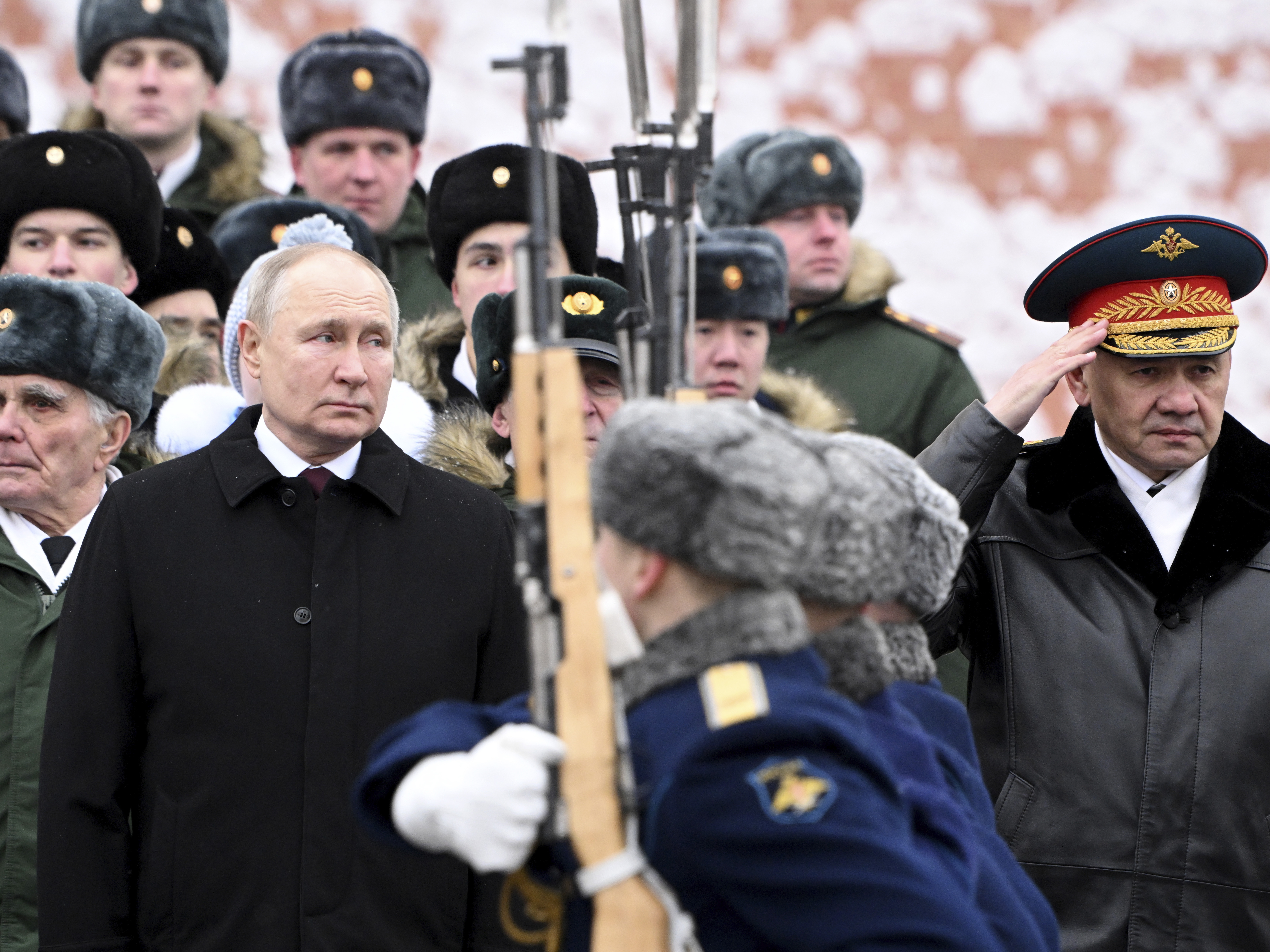
Russian President Vladimir Putin and Defense Minister Sergei Shoigu (right) take part in a wreath-laying ceremony at the Tomb of the Unknown Soldier in Alexander Garden on Defender of the Fatherland Day, in Moscow, Friday.
Sergey Guneev, Sputnik, Kremlin Pool Photo / AP
The United States is imposing sanctions on more than 500 targets it says contribute to Russia’s war machine.
The White House announced the move Friday, a day before the second anniversary of Russia's full-scale invasion of Ukraine. The sanctions focus on Russia's core financial infrastructure, as well as people and entities in other countries the U.S. says are helping supply Russia with critical technology and equipment, and to evade sanctions.
In a statement issued by the White House, President Biden said Ukraine is "running out of ammunition." He called on the House of Representatives to approve new military aid for Ukraine, which is being blocked by Republicans.
"History is watching," the president said. "The failure to support Ukraine at this critical moment will not be forgotten."
The measures are the largest sanctions imposed since Russia's full-scale invasion of Ukraine on Feb. 24, 2022, the Treasury Department said.
"There are some companies out there in these third countries that are wittingly providing resource and material support to Russia's military industrialized complex," Deputy Treasury Secretary Wally Adeyemo said briefing journalists Thursday evening. "We're going to hold them accountable."
Among the companies sanctioned is Russia's state-owned National Payment Card System Joint Stock Co., which operates a payment system widely used in Russia, the Treasury said. Scores of Russian companies producing tanks, lasers and other technology for the war effort are also targeted.
More than two dozen entities and individuals from third countries helping finance or supply technology and equipment to Russia made the sanctions list. They include a Russian-Iranian network called the Ministry of Defense and Armed Forces Logistics, which finances and produces one-way attack drones Russia has used against critical infrastructure and other civilian targets in Ukraine.
Companies from China, the United Arab Emirates, Serbia, Germany and elsewhere are also targeted for financing and exporting technology to Russia.
Adeyemo said the new sanctions, taken in partnership with the European Union and the United Kingdom, will help put "sand in the gears of Russia's military industry complex."
Some of the sanctions are in direct response to the death of Russian opposition leader Alexei Navalny last week at an Arctic penal colony. The Biden administration says it holds Russian President Vladimir Putin and his government responsible for Navalny's death.
Adeyemo said those sanctions show that "Alexei Navalny's death, and abuses that proceeded it, will not be forgotten or go unanswered."
It's unclear what impact this new round of sanctions will have. Over the past two years, Western nations have imposed roughly 2,000 sanctions on Russian companies, banks and individuals in retaliation for the Ukraine invasion.
Russia's economy has withstood the shock, in large part because of oil revenues. Western nations imposed a price cap of $60 a barrel on oil sales — enough to keep Russian crude flowing, but not make profits.
The Biden administration says the Kremlin has lost 40% of its oil revenue. It would be more, but Moscow found ways to circumvent the price cap by using so-called shadow fleets, old vessels that move Russian crude using methods to hide its origin.
Other nations help Russia evade sanctions and ensure consumer goods and critical technology, such as semiconductors and lasers, the White House says, something this new round of sanctions the U.S. hopes will address.
Copyright 2024 NPR. To see more, visit https://www.npr.org.